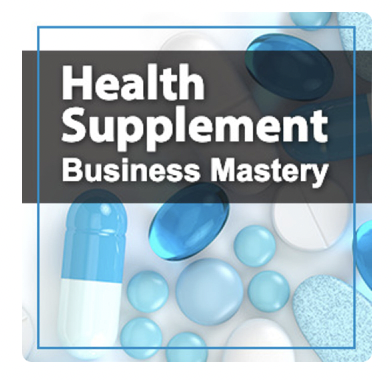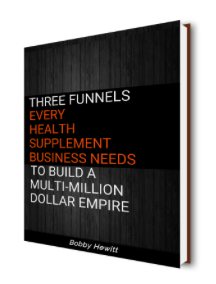Navigating all the “Gotchas” out there when selling dietary supplements online, is like walking through a mine field with tap shoes on. Make one wrong move and you could blow yourself up.
Many of our health clients take a more conservative stance and are extra cautious because of this. And I can’t blame them. You don’t want to grow your revenue to an all time high only to be shut down. We hear so many stories which could have been easily avoided and still crushed it in terms of sales and growth.
Being Handcuffed
To approach marketing dietary supplements responsibly, you need to know what you can say and how you need to say it.
Marketing dietary supplements within the legal limits of what’s allowed certainly feels like handcuffed selling. But that does not mean you can’t make improvements with A/B testing and conversion rate optimization.
It all comes down to knowing what claims you make in your marketing. The law does in fact, limit the claims that can be made on supplement labels and on the Internet.
So let’s first define…
What is a Supplement Marketing Claim
The FDA has traditionally used the term “claim” to refer to any statement made by a manufacturer or marketer that recommends or suggests a particular use of a product.
The strict definition of a claim is something that is stated or implied as being true. Typically without providing evidence or proof.
In many industries a claim without proof can cost you a sale. In the dietary supplement industry a claim without proof can cost you your business.
But it’s not as simple as having proof or not having it. Nothing is simple when the Food and Drug Administration (FDA) is involved.
Let’s start with a fundamental understanding of how the FDA classifies claims into different categories. Then we’ll explore what they consider an approved claim for use and what’s allowed.
Let’s dive in by first looking at…
3 Different Types of Health Claims
FDA approved health claims fall into three categories:
- General Health Claims
- Nutrient Claims
- Function Claims
General Health Claims are ones that describe how a dietary supplement or specific ingredient reduces risk of a disease or health-related condition.
Notice it did not state how a dietary supplement cures a disease or health-related condition. The word “cure” is in strict violation of the FDA rules.
Also notice how it did state, a disease or health-related condition. If your claim is outside of the that area, you’re not violating the rules. Meaning if the health situation is not classified as a disease or health-condition it does not fall within a General Health Claim.
It is important to also note, that the FDA has also approved a disease reduction or prevention claim as a health claim.
Meaning if it is a claim for a health product that can be used to reduce or prevent a disease or health-related condition, it falls under a General Health Claim.
Being a General Health Claim does not mean you can’t make it. It’s just one of three types of claims. We’ll get into what type of claims you can use a bit later. But first, let’s unpack a General Health Claim on the component level to examine this particular type of claim even further.
2 Components Of An Approved Health Claim
The first component is a food or dietary ingredient.
The second component of an FDA approved health claim is one about a disease or health-related condition.
If your health claim does not have either one if these two components it does not meet the regulatory definition of a health claim.
To make matters more complex, as the FDA loves to do, there are five different types of an acceptable FDA health claim. Let’s cover each briefly…
Approved claims
Which are claims that are “blessed” by the FDA after review of scientific evidence. And is outlined in the 1990 Nutrition Labeling and Education Act (NLEA).
Claims based on an authoritative statement
This type of claim is one that is supported by a scientific body of the U.S. government or the National Academy of Sciences. Which is outlined in the 1997 Food and Drug Administration Modernization Act (FDAMA).
Qualified health claims
The quality and strength of this type of claim is one where the scientific evidence is below what the FDA requires for an approved health claim. These claims must be “qualified” for accuracy and most importantly that they are not misleading in any way. Outlined in the 2003 FDA Customer Health Information for Better Nutrition Initiative (CHIBNI).
Nutrient claims
Nutrient claims describe the level of a nutrient or dietary substance in a product. For example, using terms such as “free,” “high,” and “low,” or they compare the level of a nutrient in a food to that of another food, using terms such as “more,” “reduced,” and “lite.”
The requirements that govern the use of nutrient content claims help ensure that descriptive terms, such as “high” or “low,” are used consistently for all types of food products.
Most nutrient content claim regulations apply only to those nutrients or dietary substances that have an established daily value.
But, percentage claims for dietary supplements are another category of nutrient content claims. These claims are used to describe a percentage level of a dietary ingredient for which there is no established Daily Value.
For example “40% omega-3 fatty acids, 10 mg per capsule,” and comparative percentage claims, i.e., “twice the omega-3 fatty acids per capsule (80 mg) as in 100 mg of menhaden oil (40 mg).”
Function Claims
Claims that state the role or importance of a specific ingredient in maintaining normal healthy functions of the body are, you guessed it, function claims.
Don’t Get Slapped
Sometimes marketing health supplements and functional food products can feel like you’re wearing handcuffs inside of a straight jacket while dangling over a cliff by a thread. One false move and down you’ll go. Which is why it’s not only a tricky marketing problem but also a unique one. This does not mean there’s no room for creativity.
But the last thing a growing health supplement company wants is to be shut down. Which is why, it’s so important to market a dietary supplement within the rules of allowable claims. Not only for staying in business but also for marketplace trust. There’s so much misinformation out there that consumers don’t know what or who to believe any more.
Which is why trust is such an important part of our growth model for optimizing health companies.
Discover the 3 funnels that can help your health supplement business succeed.

Listen to the Health Supplement Business Mastery Podcast for for dietary supplement entrepreneurs and marketers.



